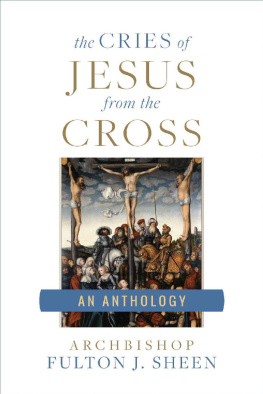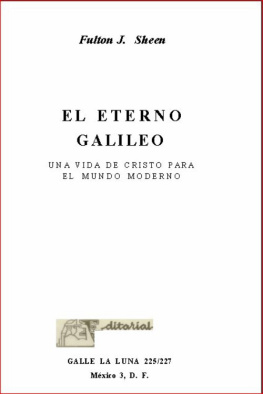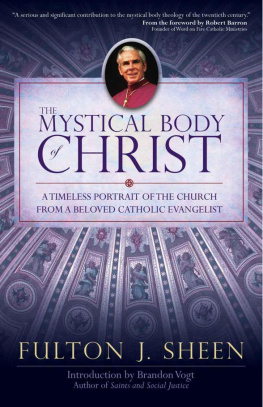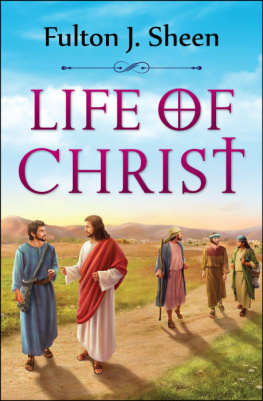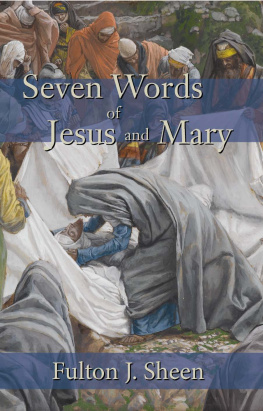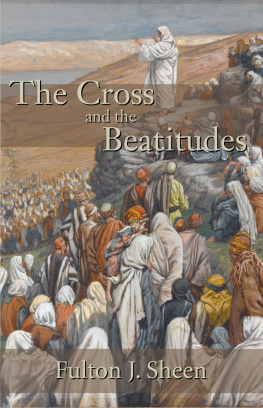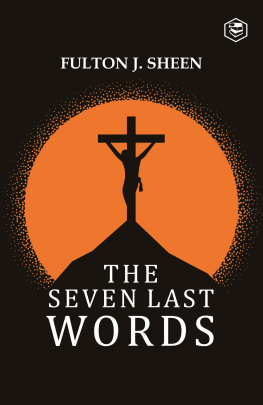A BRIEF LIFE OF CHRIST
Angelico Press reprint edition, 2011
This Angelico edition is a slightly altered
republication of the work originally published by
the Maco Magazine Corporation, New York, NY, in 1954
No part of this book may be reproduced or transmitted,
in any form or by any means, without permission
For information, address:
Angelico Press, P.O. Box 151011
San Rafael, CA 94915
angelicopress.com
978-1-887593-50-2
Cover Design: Cristy Deming
Image Credit: James Tissot (French, 18361902).
The Baptism of Jesus (Baptme de Jsus), 18861894.
Opaque watercolor over graphite on gray wove paper,
Image: 8 x 5 in. (21.6 x 14 cm).
Brooklyn Museum, Purchased by
public subscription, 00.159.49
CONTENTS
Dedicated to
the Mother of Christ
who stood beneath the Cross
and shared Compassion with Passion
and through His Mandate became the Mother of Men
Early Life of Christ
HISTORY is full of men who said that they came from God, or that they were gods, or that they bore a message from God. Buddha, Mohammed, Confucius, Christ, Socrates, Lao-Tze and thousands of otherseach has a right to be heard for his claims. There must be tests to decide whether the claims to divinity are justified. These tests, available to all men, all civilizations and all ages, are two-fold: reason and history. Reason, because everyone has it, even those without faith; history, because everyone lives in it, and should know something about it.
Our reason tells us that if any of the claimants came from God, the least that God could do to support his claim would be to preannounce his coming. Automobile manufacturers tell us when to expect a new model. If God is sending anyone from Himself with the most important message for all men, He owes it to us to let us know when the Messenger is coming, where He will be born, where He will live, the doctrine He will teach, the enemies He will make, the program He will adopt for the future, and the mariner of His death. By His conformity with these announcements, we could judge Him.
Reason further tells us that if God does not do this, then there is nothing to prevent any fool from appearing in history and saying: I am from God, or An angel appeared to me in the desert and gave me this message. In such a case there is no objective, historical test for such a messenger. We have just his word for it, and he could be suffering a delusion.
If a visitor came from a foreign country to Washington, and said he was a diplomat, we would ask to see his passport and his credentials. His papers would have to antedate his coming. If we ask for such proofs of identity from diplomats, we certainly ought to do so in the all-important subject of religion, asking: What record is there before you were born that you were coming?
With this test in mind, line up the claimants. Include anyone you please for, at the moment, Christ is no greater than any of them. We now address them: Socrates, did anyone know you were coming? Gotama, did anyone ever preannounce you and your message, and predict that one day you would sit under the Buddha tree? Mohammed, was the place of your birth recorded, and given to men centuries before, so that when you did come, men would know you were a messenger from God? Christ, did anyone know of Your coming, the circumstances of Your life, where You would live?
All are silentbut one. There were no predictions about Buddha, Mohammed, or anyone elseexcept Christ. Others just came and said: Here I am, believe me. They were, therefore, men among men, and not the Divine in the human, which is the kind of leader we want for these hard times. Christ, alone, steps out of the line and answers: My coming was foretold, even to the smallest detail.
He tells us to search the writings of the Jewish people and the correlated history of the Babylonians, Persians, Greeks and Romans, and for the moment, to regard their writings merely as historical documents, not as inspired writings. The Person of Christ in passing this test of reason and history speaks:
About two thousand years before I was born, there appeared a man, Abraham, as the head of people in whom all the nations of the earth would be blessed. About two thousand years before I was born, it was foretold that He Who would be born among the people of Abraham, would be also the expected of the nations, that is, of the Gentiles as well as the Jews. About seven hundred years before I was born, it was foretold that I would be born in Bethlehem, and that even though born in time, I already had an eternal birth.
Not only was My birthplace foretold, but about seven hundred years before, it was foretold that I would be born of a Virgin! A Virgin shall conceive and bring forth a son, and His name shall be called Emmanuel. About seven hundred years before I was born, it was foretold that the Kings of the East would bring gold and frankincense and myrrh, that I would sojourn to Egypt, and that I would live in Nazareth. About six hundred years before I was born, it was foretold that I would come within a set period after Cyrus gave out the order for rebuilding the walls of Jerusalem. About five hundred years before I was born, it was foretold that My name would be Jesus or Saviour.
Even the details of My character were preannounced, namely, that I would be kind, console the afflicted, be rejected by My own people. The details of My death were foretold: Centuries before, it was prophesied that there would be wounds in My hands and feet, that My enemies would shake dice for My garments, and yet in putting Me to death, they would not break a bone of My body. A thousand years before, it was foretold that at My death I would be given vinegar and gall in My thirst.
Six centuries before My birth, it was preannounced that I would ascend into heaven. So many prophecies were made concerning Me that at the time of My coming, the ancient synagogues collected 456 distinct prophecies. And it was not only the people of Israel who expected Me, but all the other peoples of the world.
We turn now to pagan testimony. Tacitus, speaking for the ancient Romans, says: People were generally persuaded in the faith of the ancient prophecies, that the East was to prevail, and that from Judea was to come the master and ruler of the world.
Suetonius, in his life of Vespasian, recounting the Roman tradition also said: It was an old and constant belief throughout the East, that by indubitably certain prophecies, the Jews were to attain the highest power. China had the same expectation but, because it was on the other side of the world, believed that the great Wise Man would be born in the West. The Annals of the Celestial Empire state: In the 24th year of Tchao-Wang of the dynasty of the Chou, on the 8th day of the 4th moon, a light appeared in the southwest which illumined the kings palace. The monarch, struck by its splendor, interrogated the sages. They showed him books in which this prodigy signified the appearance of the great Saint of the West whose religion was to be introduced into their country.
The Greeks expected Him, for Aeschylus in his Prometheus, six centuries before His coming, wrote: Look not for any end moreover to this curse until God appears, to accept upon His Head the pangs of thy own sins vicarious.
How did the Magi of the East know of His coming, if it was not from the many prophesies circulated through the world by the Jews and probably through the prophecy made to the Persians by Daniel more than 500 years before His Birth?
Cicero, after recounting the ancient oracles and Sibyls about a King whom we must recognize to be saved, asked in expectation: What man and of what period of time do these predictions point? The Fourth Eclogue of Virgil recounted the same ancient tradition and spoke of a chaste woman, smiling on her infant boy, with whom the Iron Age would pass away.


